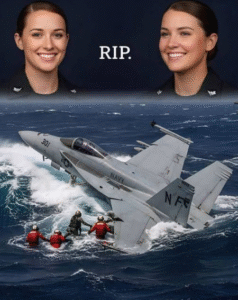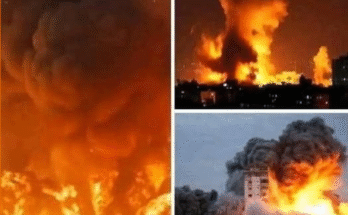IP: Two Aviators from California Lost in a Fatal Fighter Jet Accident
On a quiet September morning, the skies over Washington state bore witness to a tragedy that has shaken the U.S. military and aviation communities to their core. Two exceptional naval aviators from California—Lt. Cmdr. Morgan Evans and Lt. Serena N. Wileman—lost their lives in a fatal fighter jet crash during what was meant to be a routine training mission. Their deaths are a sobering reminder of the risks inherent in military service, even in times of peace.
🌄 The Final Flight
The accident occurred during a training exercise involving an EA-18G Growler, a state-of-the-art electronic warfare aircraft. The jet went down in a remote, mountainous region east of Mount Rainier, at an elevation of roughly 6,000 feet. The terrain, known for its ruggedness and unpredictable weather, complicated recovery efforts. Rescue teams eventually located the wreckage and confirmed the heartbreaking loss of both aviators.
Though the cause of the crash remains under investigation, the Navy has pledged a full inquiry to understand what went wrong and to prevent future tragedies. But for the families, friends, and fellow service members of Lt. Cmdr. Evans and Lt. Wileman, the pain of their absence is immediate and profound.
🛫 A Legacy of Service and Excellence
Lt. Cmdr. Morgan Evans was more than a pilot—she was a trailblazer. In 2023, she made history as part of the Navy’s first-ever all-female flyover at Super Bowl LVII, commemorating 50 years of women in naval aviation. Her presence in that landmark moment reflected her role as both a pioneer and a powerful symbol of progress for women in the military.
Lt. Serena N. Wileman, a fellow Californian, joined the elite Electronic Attack Squadron 130—the “Zappers”—in 2021 after being commissioned in 2018. Her dedication, professionalism, and quiet strength earned her the respect of her peers and superiors alike. Both aviators had recently returned from a deployment in the Middle East, where they flew missions over Yemen and supported operations in the Red Sea. Their work directly contributed to defending U.S. forces against hostile threats.
💔 The Hidden Cost of Peace
Military aviation is often romanticized—the roar of jet engines, the precision of maneuvers, the gleam of medals. But behind every flight lies a quiet resolve, sharpened senses, and faith. Faith in the machine, in the training, in one another—and ultimately, in the mission. Fighter jets operate at the edge of human capacity. One moment too slow, one component misaligned, and what soars becomes what falls.
These aviators knew that. And still they rose. Not because they feared death less, but because they believed that some callings are worth more than fear. Their sacrifice did not occur on a battlefield, yet their mission bore no less weight. In striving to be ready, they gave their lives.
🕯️ Remembered in the Sky, Rooted in Our Hearts
Within their squadrons, Lt. Cmdr. Evans and Lt. Wileman were known for more than skill—they were known for character. Comrades describe them as steady souls: dependable, generous, sharp. Officers recall their excellence not only in the cockpit, but in the locker room, the classroom, and the friendships forged under pressure.
In their home communities across California, candlelight vigils now flicker in the evening winds. Memories echo in gymnasiums and schoolyards, where childhood dreams of flight first took root. And in the hearts of their families—their mothers, fathers, spouses, and siblings—a different kind of silence speaks: the ache of unfinished conversations, of empty chairs, of prayers left hanging in midair.
🇺🇸 A Nation Mourns
The loss of these two aviators has sent ripples throughout the military community. Commander Timothy Warburton, the commanding officer of the Zappers, expressed deep sorrow, calling them “irreplaceable leaders and cherished friends.” President Donald Trump issued a heartfelt statement honoring their service and sacrifice, noting that their courage and dedication will continue to inspire future generations.
Their deaths are not just a loss to their squadron, but to the broader military and aviation


